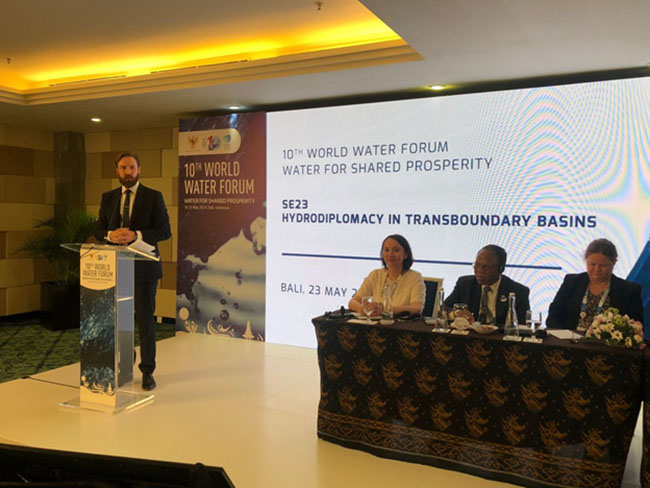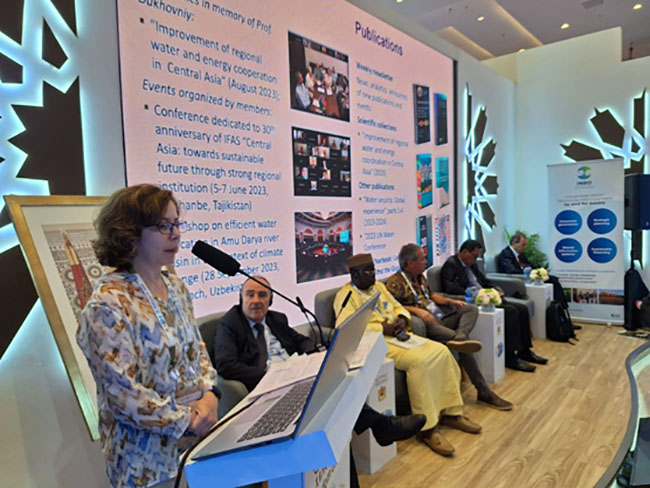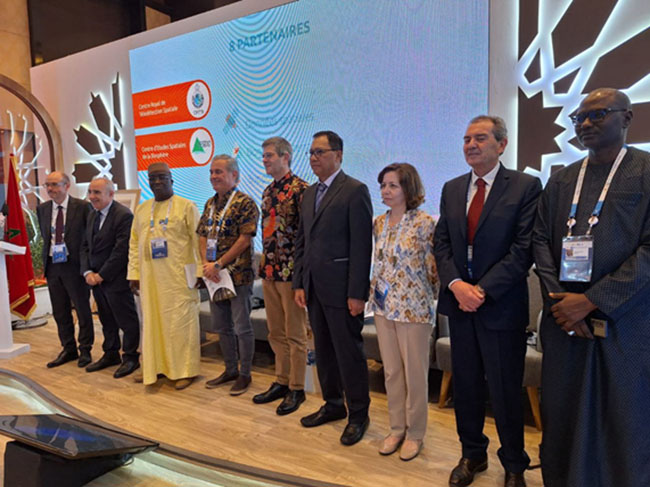No. 33 (477) May 2024
NEWS FROM THE 10th WORLD WATER FORUM
The “Hydrodiplomacy in transboundary basins” session was organized by the Senegal River Commission. The panel participants discussed the role and opportunities provided by hydrodiplomacy for transboundary cooperation. Dinara Ziganshina, Director of SIC ICWC spoke on multi- and bilateral water cooperation. She underlined the importance of strengthening the role of international law and research to form a solid basis for informed dialogue and scientific evidence-based decision making.
Remy Kinna from the Water Convention presented the tools and mechanisms developed as part of the Convention (Guidelines, Implementation Committee) and cited practical examples of their usage during treaty negotiations between countries (Limpopo basin) and establishment of joint commissions (Zambia-Uganda). Representative of the World Bank shared experience on wildlife conservation bonds/rhino bonds. Promotion of diplomacy processes was presented by the Geneva Water Hub and the International Network of Basin Organizations as well.

During the side-event in the pavilion of Japan, the participants discussed climate resilience of infrastructure and water cycle policies. The water cycle law was adopted in Japan in 2014. In 2015, a basin water cycle plan was approved after its updating to distinguish functions of ministries and agencies and pay more attention to groundwater. The three key priorities of the updated basin water cycle plan are as follows: 1) innovations through basin management; 2) safe society by implementing practical initiatives (responding to climate risks and natural disasters); 3) care of future generation by understanding the water cycle (awareness raising, education, international projects). The key area of strengthened water policy in Japan are the initiatives on water infrastructure to achieve carbon neutrality by 2050.
SIC ICWC also took part in the high level event dedicated to basin management. The event was organized by the International Network of Basin Organizations (INBO) in the pavilion of the Kingdom of Morocco, which took INBO’s chairmanship 3 years ago.
Eric Tardieu, INBO Secretary General explained the key areas of work and planned projects of the Network. Representatives of Regional networks, including European, Mediterranean, African, Asian, and Latin American, presented their current activities and future plans.
Oygul Usmanova, Head of International communications division of SIC ICWC spoke on behalf of the Eastern Europe, Caucasus and Central Asia Network of Water Management Organizations (EECCA NWO) as SIC ICWC serves as a Secretariat of the Network. She presented annual conferences and publications of EECCA NWO, underlined activities on the updating and improvement of the information portal for water and environment CAWater-Info and the establishment of a Center of Excellence on the base of the Expert platform on water security, sustainable development and future studies, with EECCA NWO partnering this platform. The mentioned activities were started as part of the Project “Regional mechanisms for the low-carbon, climate-resilient transformation of the energy-water-land nexus in Central Asia” implemented by a consortium of partners (OECD (lead), UNECE, SIC ICWC, EBRD) with the support of the German International Climate Initiative.


A session “Extreme climate and its impact on water infrastructure” was organized as part of the thematic process. The Indonesian participant presented the disaster management system in Indonesia, in particular the monitoring of reservoirs to trace online water level, inflow and outflow, seepage, etc. The rural water supply systems in Indonesia consider both system risks and vulnerabilities in the context of climate change. The importance of availability of climate resilience framework was underlined. A representative of ICOLD showed a new general approach to dam design in the context of climate change. He mentioned to high uncertainty due to climate change when considering all phenomena, including floods, that could happen during operation and therefore recommended to establish margins of uncertainty in the design of hydraulic structures. Physically based models can reduce stochastic component in the design. Practical advantages can be taken from detailed studies of wind, temperature and orography. Further, the designers should be aware of under-estimation in design range of risks.
During a panel discussion on fostering new generation of water leaders in the pavilion of Australia, a new training program for water leaders initiated by the International Water Center from Australia was presented.